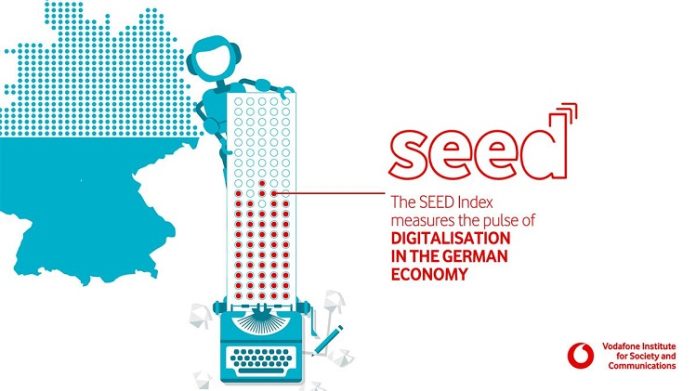
German companies are using only half the potential of digital technologies to reduce their carbon emissions or increase profits, according to a new study by Accenture on behalf of the Vodafone Institute for Society and Communication.
The Sustainable Economic Efficiency through Digitalisation (SEED) Index measures how well German companies are using digital technology to reduce carbon emissions or increase profitability.
In 2023, the SEED Index found that German companies scored only 53 out of a potential 100 points for digitalisation.
The adoption rate of digital technologies to help reduce carbon was 29% in 2023, saving 31 megatonnes CO2e. This is equivalent to only 4% of Germany’s total emissions for 2022.

German companies also increased their combined EBIT through digitalisation by €28 billion in 2023, around 9% of the possible uplift.
The potential of digitalisation for German business
Although German companies often associate increased climate protection with higher costs and lower profitability, the SEED Index found that the opposite is true.
Digitalisation has huge potential for Germany’s businesses.
By 2030, it could enable a 90% increase in EBIT, to €53 billion. At the same time, companies could reduce their CO2 emissions by 36%.
But only 45% of German companies are expected to have digitalised by 2030, significantly below their 55% expected adoption rate and wider global benchmarks.
Michael Jungwirth, Managing Director for Sustainability at Vodafone Germany said: “The findings of the SEED Index are a wake-up call for the German business community. There is a significant gap between the current state of digitalisation and what is possible – and necessary – to make our economy future-proof and sustainable at the same time.
“We are standing at a critical point where we have to decide just how serious we are about seizing the opportunities of digitalisation. The time to act is now.”
Alexander Holst, Head of Sustainability, Strategy & Consulting DACH at Accenture added: “What makes the SEED Index special is its ability to quantify the direct link between the use of digital technologies, decarbonisation and economic performance.
“This study is the only one of its kind and offers a clear roadmap for companies and policymakers to make Germany’s economy not only more competitive, but also more sustainable.”
Digital tech can help boost efficiency – and reduce carbon
Technologies are already available that could boost efficiency whilst at the same time reducing CO2 emissions.
These include ‘digital twins’ – a digital simulation of a situation that can help companies make better decisions. Other helpful technologies include smart building management and predictive maintenance, plus AI, augmented reality and the ‘Internet of Things’.
Five sectors were analysed by the SEED Index – buildings, industry, agriculture, logistics and electricity.
With an adoption rate of 33%, the electricity sector is the most digitalised in Germany.
Yet logistics only reaches 17% of its potential, with intelligent route and cargo optimisation yet to be used at scale. The logistics sector is also likely to have the lowest adoption rate in 2030 at 34%.
The Index predicts that the buildings sector will become a digital pioneer, reaching an adoption rate of 65% by 2030. This sector represents around 40% of Germany’s total CO2 emissions and will need to play a key role if Germany is to achieve its climate targets.
Agriculture is also catching up significantly, thanks to its adoption rate of 63%. It also has the highest CO2 savings potential of all the sectors examined, at almost 17%.
Intelligent soil, crop and livestock monitoring, in particular, are all set to play a role in the years ahead.
Germany’s digitalisation gap will widen between now and 2030
Taken together, digital technologies could reduce carbon emissions by around 42 megatonnes every year. This is nearly 10% of Germany’s overall CO2 emissions-reduction target for 2030.
Nearly all sectors have an opportunity to double their EBIT margin through digitalisation by 2030.
But the digitalisation gap between German companies and global benchmarks is set to widen between now and 2030.
Between them, the five sectors account for almost all of Germany’s CO2 emissions. The 26 use cases in the SEED Index cover 95% of the CO2 emissions from the companies, showing how digital solutions can help reach Germany’s climate goals.
Thomas Koenen, Head of the Digitalisation and Innovation Department of the Federation of German Industries (BDI) e.V., noted: “The SEED Index is an important yardstick and eye-opener. It shows why it is necessary to think about digitalisation and sustainability together.
“It cannot and must not be enough for us to only leverage half of the potential of digitalisation.”









